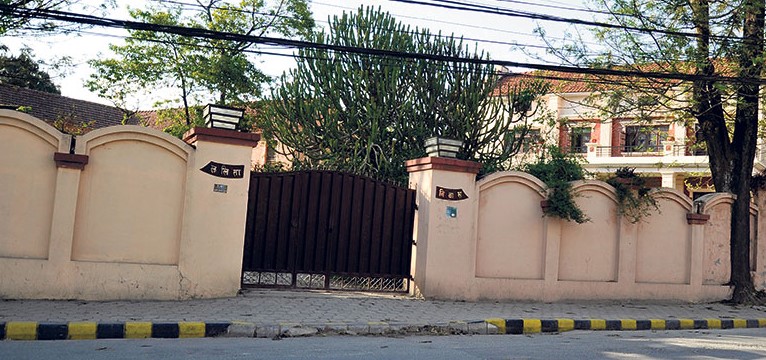KATHMANDU: The Kathmandu District Government Attorney’s Office (DGAO) has lodged a lawsuit against 290 individuals, which includes four ex-ministers, regarding their involvement in the Lalita Niwas land-grab scandal. The accused are also being sought to provide compensation exceeding Rs 18 billion.
In relation to the ongoing Lalita Niwas case, the Kathmandu District Government Attorney’s Office has resolved to proceed with legal action exclusively on the grounds of document forgery, rather than delving into the intricate web of organized criminal activities connected to the case.
Previously, the Central Investigation Bureau (CIB) conducted an extensive investigation, examining governmental documents and potential links to organized crime. After meticulously reviewing the investigation report submitted by the CIB, the government attorney’s office has chosen to exclusively focus on pursuing charges related to forgery. The requisite legal proceedings are scheduled to commence in the court shortly.
In response to the legal actions taken by the Kathmandu District Government Attorney’s Office, defense attorneys representing the accused individuals are gearing up for what promises to be a protracted legal battle. With the focus squarely on document forgery, these attorneys are expected to mount vigorous defenses, scrutinizing every aspect of the prosecution’s case.
In this high-stakes legal arena, seasoned criminal defense lawyers will employ their expertise to challenge the evidence presented against their clients, leveraging their knowledge of procedural law and case precedents to secure the best possible outcome.
Amidst the unfolding legal drama, individuals embroiled in the Lalita Niwas scandal are likely to seek representation from reputable legal firms known for their prowess in handling complex criminal cases. For instance, a Minneapolis criminal lawyer renowned for their track record of successfully defending clients in high-profile cases may find themselves at the forefront of this legal battle, employing strategic maneuvers and innovative legal arguments to safeguard the interests of their clients. As the courtroom becomes the battleground for competing narratives and legal strategies, the expertise and tenacity of defense attorneys will play a pivotal role in shaping the outcome of this landmark case.
In the realm of criminal law, the stakes are incredibly high, especially in cases that garner significant public attention. Defense attorneys must navigate a complex landscape of legal precedents, evidentiary rules, and procedural nuances to build a robust defense. Their ability to craft compelling narratives and identify weaknesses in the prosecution’s case is essential for securing favorable outcomes. As they analyze the intricacies of the law, seasoned criminal lawyers will often draw on their extensive experience and resources, including collaborations with expert witnesses and investigators, to fortify their strategies. For those seeking guidance in similar legal battles, turning to reputable firms, such as those found at https://www.sydneycriminaldefenceandtrafficlawyers.com.au/, can provide invaluable support.
Moreover, the emotional toll on defendants and their families during such turbulent times cannot be overstated. A skilled criminal lawyer not only serves as a legal advocate but also as a compassionate guide through the daunting legal process. By establishing strong relationships with their clients, attorneys can better understand the unique circumstances surrounding each case, which is critical for crafting personalized defense strategies. This holistic approach ensures that defendants feel supported and empowered, reinforcing the fundamental principle that everyone deserves a fair and vigorous defense, no matter the challenges they face.
In high-stakes legal scenarios like the Lalita Niwas scandal, where settlement may not always be a viable option, the ability to navigate a trial with confidence becomes crucial. Working with a skilled trial law firm can provide invaluable advantages in such cases. These firms are equipped with experienced litigators who excel at presenting compelling arguments and effectively managing courtroom dynamics. Their expertise ensures that clients are well-prepared for the challenges of a trial, helping to secure favorable outcomes even when negotiations fall short.
Based on the CIB report and its corresponding recommendations, individuals such as Ram Kumar Subedi, Madhavi Subedi (his spouse), Shobhakant Dhakal, former Election Commission Commissioner Sudhir Kumar Shah, ex-Ward Secretary of Kathmandu Ward-5 Shivaji Bhattarai, and former Director General of the Land Reforms and Law Department Rudra Kumar Shrestha have been identified as potential defendants.
Moreover, the report suggests considering certain individuals, including former Minister for Physical Planning and Construction Bijay Kumar Gachchhadar, former state minister Sanjay Shah, former land reforms ministers Chandra Dev Joshi and Dambar Shrestha, among others. Former chief commissioner of the Commission for Investigation of Abuse of Authority, Deep Basnyat, along with secretaries Chabi Raj Panta, Dinesh Hari Adhikari, Yubaraj Bhusal, Narayan Gopal Malego, and Rabindra Man Joshi, have also been put forth as prospective defendants in the case.
Krishna Bahadur Raut, a secretary at the Ministry of Communications and Information Technology, will also face prosecution. The District Government Attorney’s Office (DGAO) has chosen to include Raut as a defendant, despite the prior decision by CIB not to do so.
According to the DGAO, Raut has been formally designated as a defendant and the case has been submitted for registration at the Kathmandu District Court. The DGAO has now initiated legal proceedings against a total of 290 individuals, including Raut, as the accused parties.
Upon submission of the investigative report to the District Attorney’s Office, the CIB recommended that the government pursue charges against 238 individuals, encompassing four former ministers and six former secretaries, in relation to the Lalita Niwas land-grab scheme.

